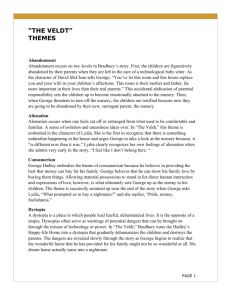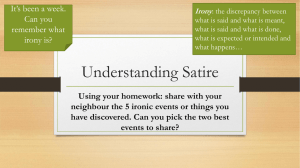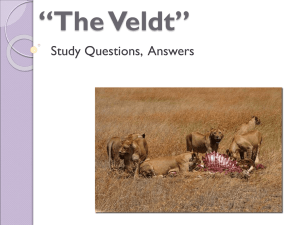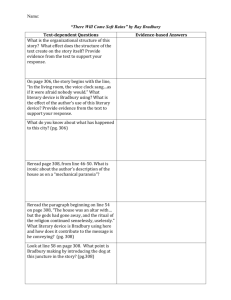Summary
advertisement
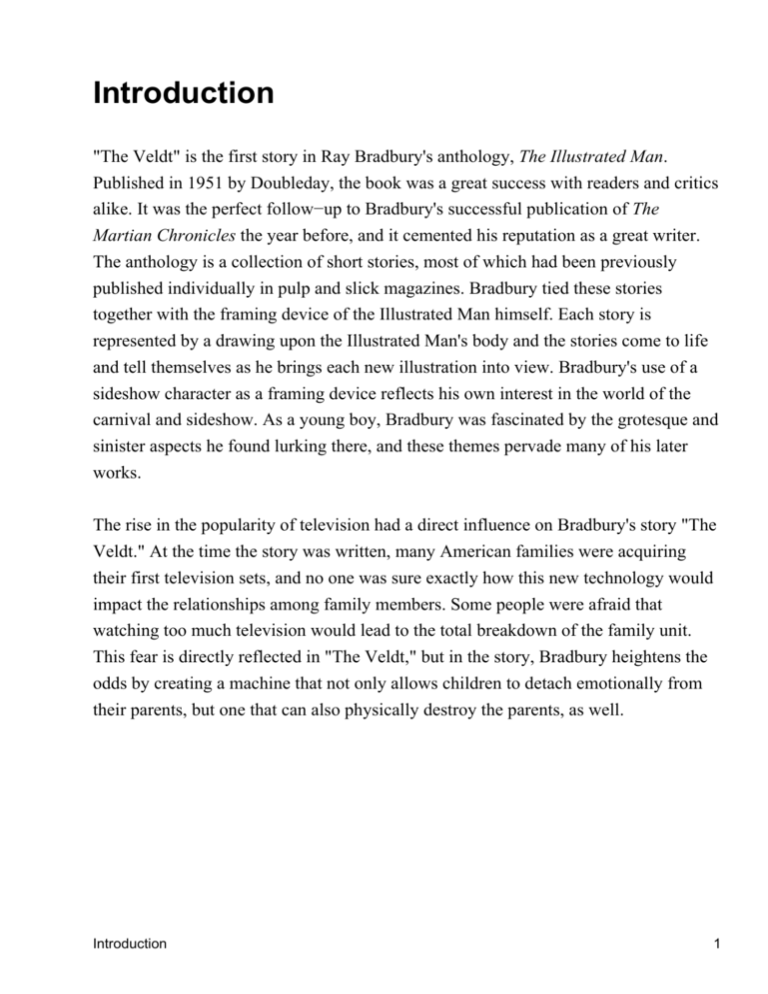
Introduction "The Veldt" is the first story in Ray Bradbury's anthology, The Illustrated Man. Published in 1951 by Doubleday, the book was a great success with readers and critics alike. It was the perfect follow−up to Bradbury's successful publication of The Martian Chronicles the year before, and it cemented his reputation as a great writer. The anthology is a collection of short stories, most of which had been previously published individually in pulp and slick magazines. Bradbury tied these stories together with the framing device of the Illustrated Man himself. Each story is represented by a drawing upon the Illustrated Man's body and the stories come to life and tell themselves as he brings each new illustration into view. Bradbury's use of a sideshow character as a framing device reflects his own interest in the world of the carnival and sideshow. As a young boy, Bradbury was fascinated by the grotesque and sinister aspects he found lurking there, and these themes pervade many of his later works. The rise in the popularity of television had a direct influence on Bradbury's story "The Veldt." At the time the story was written, many American families were acquiring their first television sets, and no one was sure exactly how this new technology would impact the relationships among family members. Some people were afraid that watching too much television would lead to the total breakdown of the family unit. This fear is directly reflected in "The Veldt," but in the story, Bradbury heightens the odds by creating a machine that not only allows children to detach emotionally from their parents, but one that can also physically destroy the parents, as well. Introduction 1 Author Biography The Veldt: Ray Bradbury [graphic graphicname="TIF00030721" orient="portrait" size="A"] Ray Bradbury was born on August 22, 1920 in Waukegan, Illinois to Esther Moberg and Leonard Spaulding Bradbury. The family moved often during Ray's childhood. From 1926 to 1933 they moved back and forth from Arizona twice. Finally, in 1934, they settled permanently in Los Angeles. Bradbury attended Los Angeles High School, where he developed a true love for writing. He joined the Los Angeles Science Fiction League and became active in the "fandom" subculture in which groups of science fiction fans would publish their own magazines known as "fanzines." In 1939, Bradbury produced four issues of his own fanzine, Futuria Fantasia. Bradbury graduated from high school in 1938 but lived with his parents while continuing to write. He began trying to sell his short stories to science fiction pulp magazines and was successful in 1941 when his first paid publication, a short story titled "Pendulum," appeared in Super Science Stories. By the early 1940s, Bradbury's short stories appeared regularly in the popular pulp magazine Weird Tales, and by 1945 Bradbury was selling stories to the more prestigious "slick" magazines. Bradbury quickly gained recognition as a talented writer. In 1946 Bradbury met Marguerite Susan McClure. The two were married in Los Angeles on September 27, 1947. The couple eventually had four daughters: Susan (1949), Ramona (1951), Bettina (1955), and Alexandra (1958). In 1947 Bradbury's first book, Dark Carnival, was published, and his reputation as a talented writer continued to grow. With the publication of his acclaimed book The Martian Chronicles in 1950, Bradbury moved to the forefront as one of the premier science fiction writers of the day. In 1951 he followed up this success with the publication of The Illustrated Man, an anthology containing the short story "The Veldt." This book was also extremely popular with readers and solidified Bradbury's Author Biography 2 reputation. Throughout the following years, Bradbury continued to build upon his success with the publication of Fahrenheit 451 (1953), Dandelion Wine (1957), and Something Wicked This Way Comes (1962). Through the remainder of the century, Bradbury continued to write novels and short stories but also branched out to many other formats and media. He has written play scripts, screenplays, teleplays, and poetry. His works have been translated into numerous languages and have been adapted many times over. In 1964 three of his short stories, were presented on stage in The World of Ray Bradbury and in 1969 a film version of The Illustrated Man was released. Bradbury also produced his own cable television series, Ray Bradbury Theater from 1985 to 1992. Bradbury's work has won innumerable awards and honors including the O. Henry Memorial Award, the 1977 World Fantasy Award for Lifetime Achievement, the 1988 Nebula Grand Master Award from the Science Fiction Writers of America, and the National Book Foundation Medal for Distinguished Contribution to American Letters. Author Biography 3 Summary and Analysis Lydia and George Hadley live in a Happy−life Home, a technological marvel that automatically tends to their every need. It dresses them, cooks the food, brushes their teeth, and even rocks them to sleep. The house also contains a high−tech nursery. Lydia tells George that she thinks something might be wrong with the nursery, and she wants him to take a look at it. They go to the nursery, and as they stand in the center of the room, the nursery's previously blank walls and ceiling come to life. The room is transformed into a genuine African veldt, complete with a blazing hot sun and all the authentic sensory experiences that would accompany such a setting. The couple stands and watches the antelopes and vultures that roam the plains. There are also lions off in the distance that seem to be feeding upon a recent kill. Suddenly the lions turn and run toward George and Lydia. The two run out of the nursery and slam the door. Lydia is still terrified that something has gone wrong and that the nursery settings are becoming too real. George assures her, however, that it is just the machinery of the room creating a realistic environment. The machine works through telepathy. It reads a person's thoughts and then projects them onto the walls to create the environment. George tells Lydia that the children have been reading a lot about Africa and that is why they have created the veldt. Lydia is still not convinced, and she insists that George lock the nursery for a few days. George is hesitant at first because he remembers the tantrums the children threw the last time he locked the nursery as a punishment. He relents, however, and locks the door. Lydia then suggests that they turn off the entire house for a few days. She is worried that she is becoming unnecessary because the house can perform the duties of wife, mother, and nursemaid. She notes that George seems to feel unnecessary too. As the two are talking in the hallway, the door of the nursery trembles as if something has jumped against it from the other side. Lydia is frightened, but George reassures her that the lions in the nursery are not real and therefore they cannot pose any real danger. Later that day, George and Lydia are eating dinner at their automated table. George is Summary and Analysis 4 still thinking about the events in the nursery. Because the nursery creates its environments by telepathically reading the children's thoughts, he is concerned about the images of death that seem to pervade the African veldt that they have created. George and Lydia both wonder why the children no longer want to create beautiful fantasy scenes like they used to. George decides to go and double−check the nursery once again. He walks in and finds himself in the middle of the veldt. Knowing that the room is programmed to react to thoughts, he attempts to change the room into a scene from Aladdin and his magic lamp. The room will not change, however. George returns to the table and tells Lydia about his inability to change the setting in the room. Wendy and Peter return home and their father questions them about the African scene in the nursery. They deny that there is an African veldt. They take their parents to the nursery and show them that it contains a lovely green forest. George suspects that they are lying, however, and he sends them to bed. Before George and Lydia leave the room, they find a wallet lying on the floor. It is one of George's old wallets. It has been chewed and has blood smears on each side. George and Lydia leave the nursery and lock the door. That night the couple are lying awake in bed discussing the nursery problem. They believe that it has caused Wendy and Peter to become spoiled and rather cold towards them. George decides that he will invite the children's psychologist, David McClean, over to take a look at the nursery to see what he thinks. A moment later, George and Lydia hear screams and the roar of lions coming from the nursery. The screams sound familiar, but the couple is not exactly sure why. The next day Peter asks his father if he is going to lock up the nursery permanently. George says that he is considering turning off the entire house for a while. Peter threatens his father that he had better not do that. Soon, David McClean arrives. George takes him to the nursery where the children are playing. It has once again been turned into an African veldt. George and David can see the lions feeding off in the distance. They send the children out. After studying the African scene for a moment, David admits that he has a very bad feeling about what is taking place. He says that Summary and Analysis 5 the children seem to care more about the room than they do about their parents and that the situation has become quite dangerous. He suggests tearing down the nursery. As David and George leave, George asks whether there is any way that the lions in the nursery environment could become real. David says he does not think so. The two then find a bloody scarf belonging to Lydia on the floor. George begins switching off the house while the children cry and beg him to stop. George says that it is time they all went on a little vacation together and that he has asked David McClean to come over to take care of the house. The children plead for just one more moment in the nursery before George continues switching it off. Lydia urges her husband to let them have a few more minutes, and he relents. The children go to the nursery while Lydia and George go upstairs to change clothes. They suddenly hear the children calling them from the nursery. They rush in, but the children are not there. The nursery is once again the veldt, and the lions are approaching from the distance. Suddenly, the door of the nursery slams. George and Lydia run to escape but discover the children have locked the door from the outside. The lions approach as George and Lydia scream. Suddenly they realize why the screams coming from the nursery had always sounded so familiar. They had been their own screams. The children calmly greet David McClean at the nursery doorway. He enters and sees the lions again off feeding in the distance. Then, Wendy politely offers David a cup of tea. Summary and Analysis 6 Characters George Hadley George Hadley is a father who wants to provide the best for his family. He loves his children, and is concerned about their welfare. He does not like acting as a disciplinarian, but will punish the children when necessary. Throughout the story, George slowly becomes frustrated with the effect the house is having on his family. He cares more for his family than he does for the convenience the automated house can provide; and therefore, he has no problem turning off the house. George does not jump to conclusions and tries to take a very logical approach to problems. George's logical nature is the reason that he does not realize the true danger of the nursery until it is too late. Lydia Hadley Lydia Hadley is a caring mother who loves her husband and her children. She is concerned that the high−tech home they are living in is having a negative effect upon the family relationships, and she longs for a return to a more traditional setting. Lydia has a strong intuition about the threat the nursery poses. Lydia wants to do what is right, but she has a hard time following through with discipline and tends to give in to her children. Peter Hadley Peter Hadley is a spoiled ten−year−old boy who does not like to be told "no." He dominates his twin sister, Wendy, and often orders her around. Peter is very strong−willed and is not afraid to stand up to his father. He has a high I.Q. and is especially knowledgeable when it comes to technology. Peter is a cold and calculating little boy who will do whatever it takes to get what he wants. He is not above using Characters 7 threats and even murder to accomplish his objectives. Wendy Hadley Wendy Hadley is ten years old and is Peter's twin sister. She is a follower who obeys the wishes of her brother. She is extremely emotionally dependent upon the nursery and is devastated when her father threatens to turn it off permanently. Wendy has no emotional connection to her parents whatsoever and, therefore, has no remorse for setting them up to be killed. David McClean David McClean is a psychologist and a family friend. He is astute when it comes to recognizing the threat that some children's fantasies allude to. He immediately recognizes the dangerous state of mind that the children are in and wants to try and help George repair the emotional damage the nursery has caused. Wendy Hadley 8 Themes Abandonment Abandonment occurs on two levels in Bradbury's story. First, the children are figuratively abandoned by their parents when they are left in the care of a technological baby sitter. As the character of David McClean tells George, "You've let this room and this house replace you and your wife in your children's affections. This room is their mother and father, far more important in their lives than their real parents." This accidental abdication of parental responsibility sets the children up to become emotionally attached to the nursery. Then, when George threatens to turn off the nursery, the children are terrified because now they are going to be abandoned by their new, surrogate parent, the nursery. Alienation Alienation occurs when one feels cut off or estranged from what used to be comfortable and familiar. A sense of isolation and uneasiness takes over. In "The Veldt," this theme is embodied in the character of Lydia. She is the first to recognize that there is something unfamiliar happening in the house and urges George to take a look at the nursery because, it "is different now than it was." Lydia clearly recognizes her own feelings of alienation when she admits very early in the story, "I feel like I don't belong here. " Consumerism George Hadley embodies the theme of consumerism because he believes in providing the best that money can buy for his family. George believes that he can show his family love by buying them things. Allowing material possessions to stand in for direct human interaction and expressions of love, however, is what ultimately sets Themes 9 George up as the enemy to his children. The theme is succinctly summed up near the end of the story when George asks Lydia, "What prompted us to buy a nightmare?" and she replies, "Pride, money, foolishness." Dystopia A dystopia is a place in which people lead fearful, dehumanized lives. It is the opposite of a utopia. Dystopias often serve as warnings of potential dangers that can be brought on through the misuse of technology or power. In "The Veldt," Bradbury turns the Hadley's Happy−life Home into a dystopia that gradually dehumanizes the children and destroys the parents. The dangers are revealed slowly through the story as George begins to realize that the wonderful home that he has provided for his family might not be so wonderful at all. His dream home actually turns into a nightmare. Illusion versus Reality The ability to distinguish illusion from reality and the co−mingling of the two is a key theme in "The Veldt." George ultimately agrees to turn on the nursery one more time, thus putting himself and his wife in jeopardy, because he believes that there is a definite distinction between illusion and reality. Something that is an illusion can never become truly "real." This is why George believes that the lions pose no real threat. They are only part of a machine that creates wonderful illusions, "Walls, Lydia, remember; crystal walls, that's all they are. Oh, they look real, I must admit—Africa in your parlor—but it's all dimensional superactionary, supersensitive color film and mental tape film behind glass screens." What George fails to understand is, in the world of this short story, illusion and reality are transposable. One can become the other at any moment. Dystopia 10 Man versus Machine One of the major conflicts in Bradbury's story is that of man versus machine. The story is built around the struggle to control and direct the destructive power of the nursery's technology. Whoever controls the machine will have the ultimate power. In this story man is destroyed by the machines in two ways: not only are George and Lydia murdered by the nursery's technology, but the children's humanity is also destroyed. By identifying so closely with the nursery, the children have become less than human. They feel no guilt, remorse or regret when their parents die, and it is clear that they have become as cold and emotionless as the machinery that controls the nursery. Revenge "The Veldt" can be read as the ultimate children's revenge story. Children often feel powerless against adults and create elaborate fantasies in which they have the power to conquer any adult who refuses to give them what they want. George triggers these fantasies in Peter and Wendy when he forbids them to take the rocket to New York. The children are used to getting their own way, and they become very angry when they cannot have what they want. Thus the cycle of revenge is set in motion. Telepathy Telepathy plays an important role in "The Veldt" as it provides the medium through which the weapons are deployed. The room manifests thought patterns on its walls, thus creating the possibility for evil thoughts to conjure up evil things. The children are able to use their telepathy to direct their destructive powers into the nursery images, thus creating a deadly setting for their parents. In the scientifically advanced world of this short story, thoughts have now become weapons, and children can kill their parents just by wishing them dead. Man versus Machine 11


